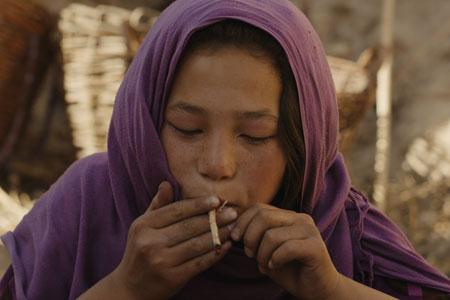When Katja Adomeit first met the young Afghan director Shahrbanoo Sadat when they were teamed up by CPH:LAB, the talent programme established by the CPH:DOX, Sadat just shaved off her hair in protest at the Afghan practice of rejecting brides for non-virginity: "She’s 1'50", I'm 1'80", she stands in front of me with her shaved head, tells me this story, and I feel, I've just fallen in love with this person and there's no way she will make a film without me for the rest of her life – seriously!" says Adomeit.
She hasn't yet. They co-directed the semi-fictional "Not at Home" within eight months of that meeting – Sadat shooting amidst the different generations of a family in Kabul, Adomeit in a refugee centre in Germany. And now, four years after, the pair is heading to Cannes, where Sadat's feature debut "Wolf and Sheep" is selected for Directors' Fortnight.
"She's only 26, and she's the first female Afghan director. I wanted to support her vision of depicting another Afghanistan than the one we see in the media, where the war and the Taliban dominate the agenda. She wants to show life as lived in a village from a part of the country without war and violence. I'm proud that Denmark is contributing to making that vision a reality," says Adomeit, who strung together an impressive patchwork of financers, including 413 crowdfunders, while maintaining the project as a Danish major production.
Travelling with 38 Afghans
"Wolf and Sheep." Photo: Virginie Surdej
Because of the security situation in Afghanistan, the team decided to move the shoot to Tajikistan, north of the Afghan border, which, to put it mildly, was a logistical challenge.
"In order to portray an Afghan village and an Afghan community one to one, we built an entire village in the middle of the mountains in Tajikistan and flew 38 Afghans in from central Afghanistan. Receiving visas for 38 Afghans from the Tajik Foreign Ministry who is afraid that some of them have relations to Taliban or ISIS, while trying to collect all the Afghan cast who have never been out of their village before and had to travel for 35 hours – that was pretty crazy," she says.
"Sometimes, I think about how this film that could have been actually very simply produced in a small village in Afghanistan, where everything exists, has become a quite complicated film. And I get upset about the fact that Shahrbanoo doesn't have the opportunity to make films in her own country."
Looking for Lighter Ways of Producing
Based in Copenhagen since 2006, German-born producer Katja Adomeit has lately garnered attention for her work on such co-productions as Ruben Östlund's "Force Majeure," as well as distinctly independent productions of her own such as Daniel Joseph Borgman's "The Weight of Elephants" and Anna Eborn's "Pine Ridge." Respectively a New Zealand-set drama and a documentary about the Lakota reservation in South Dakota, both films steer decidedly keen, fresh courses through their material. Upcoming films include Borgman's , "Loving Pia", a "process-driven" experimental project about an intellectually challenged 60-year-old woman who lives with her mother – Eborn's "Lida," a portrait of a late Swedish woman in the Ukraine, one of the very last of an expat community deported by Catherine the Great, and Frida Kempff's documentary "Winter Buoy."
Katja Adomeit. Photo: Niels Buch
On the back of them Adomeit was named one of Screen International's "Future Leaders" in 2013 and Producer on the Move in Cannes in 2015. She continues to forge productive relationships with new talents and find stories in locations all over the world.
Adomeit describes her mode of film producing as being "the wall" a director/screenwriter can lean on "whenever they need something, whatever that may be, from beginning to end." She's proud of all her productions: "When I'm producing I'm always like, 'This is amazing'. I guess I love the teamwork, joining together on something that we're going to make no matter what. It's us against the world, and with the world, and with financing from all over the world.
"My role is about writing lots of applications, finding money and the crew, but also about creative input, finding new ideas and the right process of development and production," she continues. "I'm all about finding non-traditional methods that can be low-budget or cost-efficient while also forming a more creative environment. It's looking for a lighter way that can also make the final product more creative and original. I hate sets full of make-up and lighting people and grips. It's incredibly boring and not about making a new kind of film anymore."
This article written by Nick Bradshaw was first published in FILM Cannes Issue 2015. It has been updated with quotes on "Wolf and Sheep."


